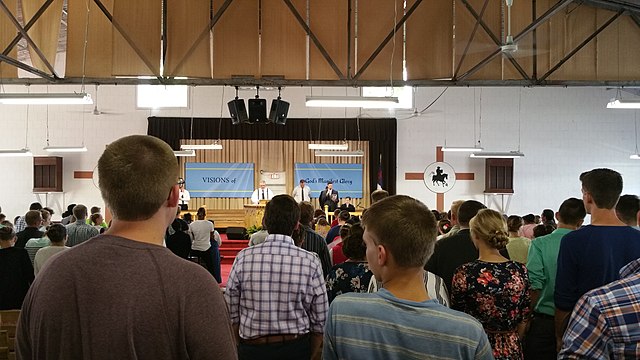Conservative holiness movement
The conservative holiness movement is a loosely defined group of theologically conservative Christian denominations with the majority being Methodists whose teachings are rooted in the theology of John Wesley, and a minority being Quakers (Friends) that emphasize the doctrine of George Fox, as well as River Brethren who emerged out of the Radical Pietist revival, and Holiness Restorationists in the tradition of Daniel Sidney Warner. Schisms began to occur in the 19th century and this movement became distinct from parent Holiness bodies in the mid-20th century amid disagreements over modesty in dress, entertainment, and other "old holiness standards" reflective of the related emphases on the Wesleyan–Arminian doctrine of outward holiness or the Quaker teaching on the testimony of simplicity or the River Brethren and Restorationist teachings on nonconformity to the world, depending on the denomination. Christian denominations aligned with the conservative holiness movement share a belief in Christian perfection, though they differ on various doctrines, such as the celebration of the sacraments and observance of ordinances, which is related to the denominational tradition—Methodist, Quaker, Anabaptist or Restorationist. Many denominations identifying with the conservative holiness movement, though not all, are represented in the Interchurch Holiness Convention; while some denominations have full communion with one another, other bodies choose to be isolationist.

Grace Wesleyan Methodist Church is a parish church of the Allegheny Wesleyan Methodist Connection and is located in Akron, Ohio.
A service of worship at the tabernacle of a camp meeting of the Allegheny Wesleyan Methodist Connection, held at Wesleyan Methodist Camp in Stoneboro, Pennsylvania
The entrance to the Evangelical Wesleyan Bible Institute (EWBI) in Cooperstown
Wesleyan theology, otherwise known as Wesleyan–Arminian theology, or Methodist theology, is a theological tradition in Protestant Christianity based upon the ministry of the 18th-century evangelical reformer brothers John Wesley and Charles Wesley. More broadly it refers to the theological system inferred from the various sermons, theological treatises, letters, journals, diaries, hymns, and other spiritual writings of the Wesleys and their contemporary coadjutors such as John William Fletcher.
Memorial to John Wesley and Charles Wesley in Christ Church Cathedral, Oxford
Jacobus Arminius was a 17th-century Dutch theologian
John Wesley was an Anglican clergyman
Methodists believe Jesus Christ died for all humanity, not a limited few: the doctrine of unlimited atonement.







